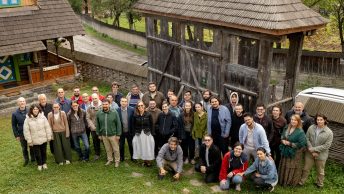A slightly revised & enlarged version of notes taken from a brief talk I gave in Bodrum, Turkey, in 2006:
«Orthodoxy & freedom. Rothbard presented Marx as a
religious eschatologist, imbued with Satanist spirituality. This suggests
collectivism and personal freedom can be seen as projections of certain
eschatologies/spiritualities. Is there a libertarian eschatology/spirituality? Eschatologies fall into 2 broad types:
1. Reabsorbtionist (after death there is no person, just “reabsorbtion” into a big impersonal blob, or nothingness), so there is no long run personal interest in anything. Reabsorbtionist spirituality is the attempt to bring about the reabsorbtion (“salvation” through depersonalization) at a much earlier time. Depersonalization rhymes with axiologic anarchism, secular or “spiritualized” nihilism, a.k.a. “immanentizing the Gnostic eschaton”. Human action, personal and interpersonal moral responsibility, are seen as matters of false consciousness. Emphasized instead are “alienated”, mechanicist, interchangeable, automaton-like “individuals”, reacting to stimuli. These are subject to either reabsorbtion into “higher” collectivist wholes, through engineering their environment, or (if the cost of doing so becomes prohibitive), to Caiaphas’ (and Machiavelli’s) “ethics” of “collateral damage”: it is better that one innocent man die for society than that the whole nation perish.
2. Personalist eschatology emphasizes acting and morally responsible persons, and the possibility of achieving everlasting personal joy through non-conflictual interpersonal dialogue. Personal happiness depends on how individuals relate to God and each other. According to Orthodox Christianity, joy (even in times of worldly sorrow) depends on voluntary communion with God, and God-centered love for all other people. Orthodox spirituality/eschatology is not merely an intellectual foundation for the idea of rightly understood long run personal interest.
It is also – and most importantly – the existential experience of the saints: an unbroken historical testimony, icon and guide to how the receipt for happiness via interpersonal dialogue works. Orthodoxy claims to be THE personalist spirituality. As such, it provides the logical and existential spiritual foudation of personalist law & economics (of “libertarianism”). Universalizabe personalist ethics is rooted in the person of God incarnated, Who says: whatever you do to the least of My brothers you do to Me. Communion is part of the package: you cannot do anything without Me, says Christ, and every good and perfect gift is from above…
In the Orthodox tradition, the state was never recognized as natural, nor
was slavery; they were accepted only as expressions of a historically
“fallen”, corrupted condition, permeated by sin. But nature is called to be
cleansed, restored, and sanctified in Christ, through the (largely ascetic,
and only auxiliarily intellectual) labors of interpersonal synergy with His
grace.
Immediate relevance: Why be a libertarian; why am I a libertarian; why
should I expect the world to become libertarian? Many unsatisfactory
answers.
Rothbard: Because you have a passion for justice; but that is akin to
emotivism. The next man can have a passion for stamp collecting, etc.,
implying trade-offs. The “passion” approach leads to contextual ethics.
I can say “I have a vision”, but Machiavelli can say the same. Vision
approaches beg the question: why endorse the “vision” as a “honest” person, rather than as a “cheating” Machiavellian? To say that a “good man” is inspired to play by the rules he preaches is circular, akin to “be altruist because you’re good”. Contextual ethics implied again.
Maybe logical consistency? One cannot argue consistently against
libertarianism. But will consistency make me happier? If not, we’re back to
nihilism. Why not try other, semmingly “cooler” alternatives. Self-destructionism? Destructionism?
Central question obfuscated: What makes men happy? One needs to make the case that consistency (universalizability, dialogue, etc.) is part of a (obviously larger) package – natural law – that provides long run (and
even enough present) personal happiness.
According to Orthodoxy, natural law, spiritual law and scriptural law are
one and the same. Adhering to these laws makes not only happy, but creates society, making the necessary (worldly) sacrifices to create public goods privately rational. Insofar that even libertarianism (the most workable social arrangement) requires a fair amount of virtue (“social altruism” to make “social rationalism” work), it takes a critical number of Orthodox people to ever make it relevant, socially and in the long run (more so than stamp collecting, say).
Libertarianism, therefore, is the “premature child” of the Orthodox Church. Its child as the worldly projection of Orthodox spirituality/eschatology, of personalist “otherworldly worldliness”.
Prematurely born because genuine Orthodox spiritual life was yet too scarce & superficial to provide enough & renewable character: the essential complementary good of freedom, in the natural-spiritual receipt of long-run personal & interpersonal joy. So libertarian notions tend to be taken over & perverted by the Machiavellians»
Suggested readings:
M. N. Rothbard, Karl Marx: Communist as Religious Eschatologist




